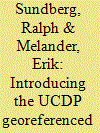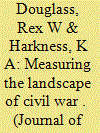| Srl | Item |
| 1 |
ID:
122903


|
|
|
|
|
| Publication |
2013.
|
| Summary/Abstract |
This article presents the UCDP Georeferenced Event Dataset (UCDP GED). The UCDP GED is an event dataset that disaggregates three types of organized violence (state-based conflict, non-state conflict, and one-sided violence) both spatially and temporally. Each event - defined as an instance of organized violence with at least one fatality - comes with date, geographical location, and identifiers that allow the dataset to be linked to and merged with other UCDP datasets. The first version of the dataset covers events of fatal violence on the African continent between 1989 and 2010. This article, firstly, introduces the rationale for the new dataset, and explains the basic coding procedures as well as the quality controls. Secondly, we discuss some of the data's potential weaknesses in representing the universe of organized violence, as well as some potential biases induced by the operationalizations. Thirdly, we provide an example of how the data can be used, by illustrating the association between cities and organized violence, taking population density into account. The UCDP GED is a useful resource for conflict analyses below the state and country-year levels, and can provide us with new insights into the geographical determinants and temporal sequencing of warfare and violence.
|
|
|
|
|
|
|
|
|
|
|
|
|
|
|
|
| 2 |
ID:
158211


|
|
|
|
|
| Summary/Abstract |
Subnational conflict research increasingly utilizes georeferenced event datasets to understand contentious politics and violence. Yet, how exactly locations are mapped to particular geographies, especially from unstructured text sources such as newspaper reports and archival records, remains opaque and few best practices exist for guiding researchers through the subtle but consequential decisions made during geolocation. We begin to address this gap by developing a systematic approach to georeferencing that articulates the strategies available, empirically diagnoses problems of bias created by both the data generating process and researcher-controlled tasks, and provides new generalizable tools for simultaneously optimizing both the recovery and accuracy of coordinates. We then empirically evaluate our process and tools against new micro-level data on the Mau Mau rebellion (colonial Kenya 1952–60), drawn from 20,000 pages of recently declassified British military intelligence reports. By leveraging a subset of these data that includes map codes alongside natural language location descriptions, we demonstrate how inappropriately georeferencing data can have important downstream consequences in terms of systematically biasing coefficients or altering statistical significance and how our tools can help alleviate these problems.
|
|
|
|
|
|
|
|
|
|
|
|
|
|
|
|